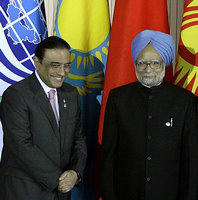NEW DELHI -- Two weeks after issuing a joint statement in Egypt that was welcomed around the world as a much-needed step towards narrowing their differences through dialogue, India and Pakistan have returned to their previously stated, belligerent positions. The two neighbours, whose history of conflict goes back over six decades, have backed off from the eyeball-to-eyeball confrontation witnessed after the Mumbai terror attacks last November. But fresh questions are being raised here about Pakistan's resolve in acting against terror groups active against India.
The U.S. has helped keep the peace between the two countries in the past. After the Mumbai attacks, for instance, India counted on U.S. influence over Pakistan to bring the alleged perpetrators to justice. Now, as President Barack Obama's special envoy to Afghanistan and Pakistan, Richard Holbrooke, prepares to visit New Delhi, the U.S. finds itself in the tricky situation of being seen as significantly more indulgent towards Pakistan than it has been in the recent past, at the same time that India is in the midst of a renewed debate over its own ties with Islamabad.
The debate has brought out a dichotomy in Indian thinking. New Delhi is all for U.S. intervention when it comes to leaning on Pakistan to act against terror groups that target India. But any suggestion that Washington might play a more direct role in resolving the Kashmir dispute that is at the core of the India-Pakistan conflict is strictly off limits.

